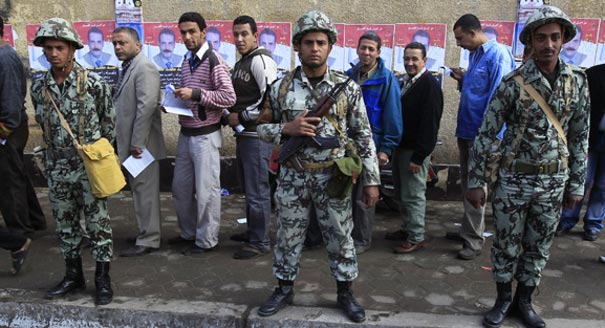Lessons from Korea’s political right.
Darcie Draudt-Véjares
{
"authors": [
"Amr Hamzawy"
],
"type": "legacyinthemedia",
"centerAffiliationAll": "",
"centers": [
"Carnegie Endowment for International Peace",
"Carnegie Europe",
"Malcolm H. Kerr Carnegie Middle East Center",
"Carnegie Russia Eurasia Center"
],
"collections": [
"Arab Awakening"
],
"englishNewsletterAll": "",
"nonEnglishNewsletterAll": "",
"primaryCenter": "Carnegie Endowment for International Peace",
"programAffiliation": "",
"programs": [],
"projects": [
"Eurasia in Transition"
],
"regions": [
"North Africa",
"Egypt",
"Middle East"
],
"topics": [
"Political Reform",
"Democracy"
]
}
Source: Getty
Egypt has been fundamentally changed by the events since Jan. 25, and the challenge now is to translate the changes flowing from the popular uprising into the concrete procedures and safeguards necessary for a genuine transition to democracy.
Source: Washington Post

Recent events have compelled Egyptian intellectuals, politicians, entrepreneurs, journalists and others to join together to find a way out of the impasse between protesters and the Mubarak government. The Committee of Wise Men, for which I serve as spokesman, aims to be a mediating body between the two sides as well as present some kind of a road map for the transition.
We called on Mubarak to demand a set of constitutional amendments before delegating control of the transition process. This transition must include a lifting of the state of emergency; the dissolution of the illegitimate People's Assembly and Shura Council (the two chambers of Parliament that have come from rigged and flawed elections); the formation of an independent legal committee to amend the constitution; and the lifting of laws restricting political freedoms. These are the essential steps that will put Egypt on a safe path to democracy. They are also the steps by which the international community should judge our government's commitment to reform.
Only with clear and serious guarantees will the hundreds of thousands of people who have protested peacefully for a democratic government be convinced that this a serious proposition, one that underpins their security and safety and ensures that those responsible for the violence, human rights abuses and bloodshed in recent days are to be brought to account.
Otherwise, the long heritage of suspicion and distrust that so many in Egypt share about the regime's promises to allow real change will be entrenched, and it will make them fearful of what will come next if they no longer demonstrate.
Egyptians must do more than just protest. The absence of a youth movement with clear leadership and representation has been one obstacleto meaningful negotiation. There has been limited dialogue between state institutions and the youth groups as well as between the state and various political actors and committees. We believe we have responsibilities, starting with helping our young people see how to establish a democratic framework to represent their interests as a viable collective force and not as individuals. State institutions must in turn accept a collective dialogue with representatives of our youth.
We are convinced that the best way forward is to institutionalize the dialogue taking place today and convert it into a national conference or round-table negotiation between state institutions, youths, the political forces and independent national figures. This model would establish the powers and set the specific timeframes to produce a democratic political system in Egypt. And only then will the people's revolution be safe.
Carnegie does not take institutional positions on public policy issues; the views represented herein are those of the author(s) and do not necessarily reflect the views of Carnegie, its staff, or its trustees.
Lessons from Korea’s political right.

Darcie Draudt-Véjares
Europe’s interests in Syria extend beyond migration management, yet the EU trails behind other players in the country’s post-Assad reconstruction. To boost its influence in Damascus, the union must upgrade its commitment to ensuring regional stability.


Bianka Speidl, Hanga Horváth-Sántha
European democracy support strategy in 2025 prioritized protecting democratic norms within Europe. This signals the start of a structural recalibration of the EU’s approach to democracy support.



Richard Youngs, ed., Elena Viudes Egea, Zselyke Csaky, …
Despite its reputation as an island of democracy in Central Asia, Kyrgyzstan appears to be on the brink of becoming a personalist autocracy.

Temur Umarov
Having failed to build a team that he can fully trust or establish strong state institutions, Mirziyoyev has become reliant on his family.

Galiya Ibragimova